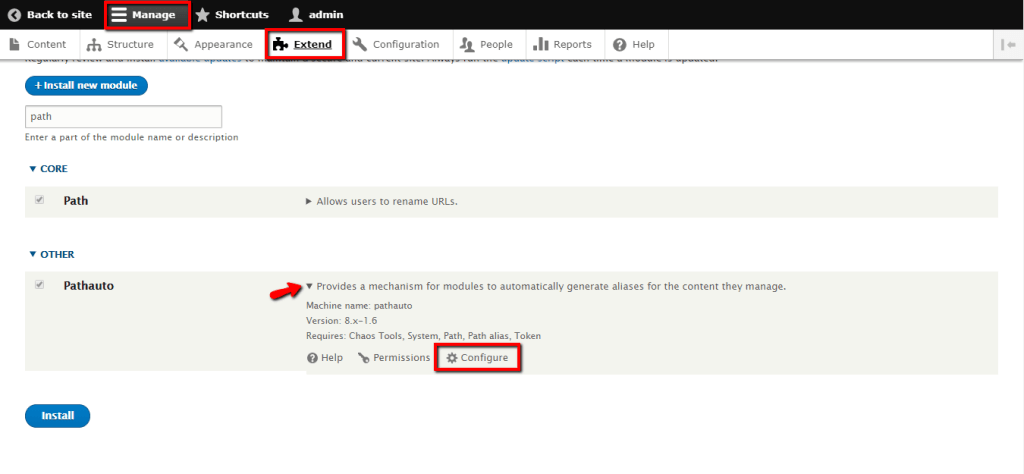

In my content type, I have the field set up as a Hierarchical Select widget with Term reference as the field type. If I set the pattern to //, then the URL alias generated is: category1-subcategory1a/subcategory1a/.

#Drupal pathauto update#
Scroll down to the Update action section and select Create a new alias. diff -git a/ b/ index 6e95e 100644 - a/ +++ b/ -1,6 +1,6 name : 'Pathauto. Expand the Pathauto module section by clicking on the down arrow in the description: Click on the Configure link within the expanded description area. The tokens related to individual content items ("nodes") listed are: Search for Pathauto from the module list. Or is there a way to create the pattern: //? Pathauto Aprende a configurar urls amigables y patrones de url para tus contenidos. Is there a way to have a "/" appear between the parent term and subterm instead of a dash? If I set the pattern to be /, then the URL alias generated is: category1-subcategory1a/. I have Drupal 7.22, Entity API 7.x-1.0-rc3, and Pathauto 7.x-1.1 and have been trying different token patterns in the URL aliases I'm trying to create a URL pattern for the content path so it has the following URL pattern: category1/subcategory1a/. You can follow this here.I'm not sure if this is the appropriate place for this question (I'm a self-proclaimed newbie).I have a vocabulary with the following scheme: Do note that this module is included in Drupal 8, but the file transliteration does not work yet and will be included only in Drupal 8.3. Unfortunately at the moment docs for this are not available online. cleanString ( ) method in AliasCleaner.I suggest just installing Devel and playing around with this to understand how it works and what kind of strings will you get back. The function actually does not exist anymore and is replaced with alias_cleaner service. Pathauto: generate URL path aliases automatically. Also, it is still mentioned in 2 comments in the code. That's pretty much it! If checking the docs online, you will notice some inconsistencies because the pathauto_cleanstring ( ) is still listed as a valid function in Pathauto for D8, while in reality it does not exist anymore. I have Drupal 7.22, Entity API 7.x-1.0-rc3, and Pathauto 7.x-1.1 and have been trying different token patterns in the URL aliases section. The return value in both cases will be your -very -dirty -string -many -url -un -friendly -parts. The Pathauto module creates automatic path aliases for content, users, and taxonomy terms, eliminating the need to create them manually. category1 subcategory1a subcategory1b I'm trying to create a URL pattern for the content path so it has the following URL pattern: category1/subcategory1a/ node:title. $clean_string = \Drupal :: service ( 'pathauto.alias_cleaner' ) -> cleanString ( 'Your very dirty string, with many URL un-friendly parts!' )
#Drupal pathauto code#
This works for all accented characters as well as non-alphabet writing systems such as Cyrillic.įinally, here's the code you would need to use for Drupal 7: In short, it transliterates all strings in URLs and filenames so you can get standardized, clean strings that work everywhere and without encoded links. This module is an absolute must have for any website where you might need to upload files or deal with different encodings. Out of the box you get the additional filters and modules that build on top of Pathauto, such as the excellent Transliteration module for Drupal 7 (included in D8 core).This can be configured at /admin /config /search /path /settings for both Drupal 7 and Drupal 8. Pathauto will automatically remove the commonly used words such as "a", "an", "as", etc.You won't have to maintain the function itself.There are a few reasons why you would want to use Pathauto's function instead of doing this on your own:
#Drupal pathauto how to#
Even though I was the one that asked the question on how to replace it with custom code, the only instances in which I did not use the module were private websites where URLs did not have any purpose (not even for block visibility).

It provides you with a way to configure clean URLs for almost any aspect of your website (users, nodes, taxonomies). This worked for me: node:menu-link:parents:join-path/ node:menu-link Share Follow answered at 18:11 Ian Link 684 1 8 11 Works perfectly for me. Pathauto is one of the most installed modules. 10 Answers Sorted by: 45 Just an update in case anyone comes across this with a more recent version of Pathauto/Token. Even though writing such helper function is not hard, you will soon find out that there are edge cases in which maintaining your own code does not make much sense, such as filtering out and converting non-alphanumeric characters. In certain odd cases you will find yourself needing to clean a string so you can use it in a URL.


 0 kommentar(er)
0 kommentar(er)
